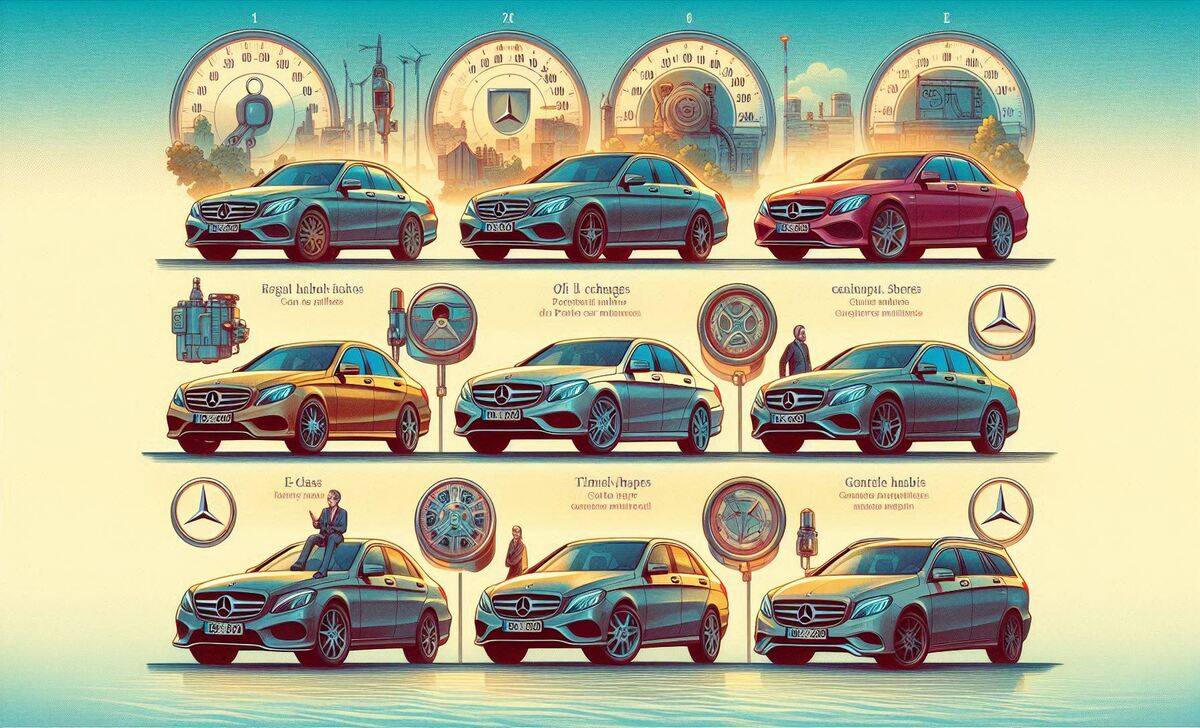When investing in a luxury vehicle like a Mercedes-Benz, understanding its longevity is crucial. Many experts agree that with routine maintenance, Mercedes-Benz vehicles can last anywhere from 150,000 to 200,000 miles on average.
This impressive lifespan is attributed to the brand’s commitment to engineering excellence, quality materials, and advanced technology. Regular servicing, including oil changes, brake inspections, and timely repairs, ensures that these vehicles remain reliable and perform optimally over the years. Here’s a breakdown of how many miles different types of Mercedes-Benz models can last:

How Many Miles Can Different Types Of Mercedes-Benz Models Last?

1.Mercedes-Benz Sedans
- C-Class: The Mercedes-Benz C-Class, known for its blend of luxury and performance, can last between 200,000 to 250,000 miles with proper maintenance. Regular oil changes, timely repairs, and gentle driving habits contribute to its longevity.
- E-Class: The E-Class is often celebrated for its durability and reliability. With consistent care, an E-Class can easily surpass 250,000 miles, making it a popular choice for those seeking a long-lasting luxury sedan.
- S-Class: As the flagship model, the S-Class is built with the highest quality materials and engineering. It is not uncommon for an S-Class to reach 300,000 miles or more, provided it is well-maintained and driven responsibly.
2.Mercedes-Benz Suvs

- GLC: The compact GLC SUV offers a balance of comfort and capability. With regular maintenance, a GLC can last around 200,000 to 250,000 miles. Attention to routine services and addressing minor issues promptly can extend its lifespan.
- GLE: The midsize GLE SUV is popular for its robustness and versatility. Owners can expect their GLE to last between 250,000 to 300,000 miles with diligent care and maintenance.
- G-Class: The iconic G-Class SUV, with its rugged construction and off-road capabilities, can last well beyond 300,000 miles. Its durable design and engineering make it one of the longest-lasting Mercedes-Benz models.
3.Mercedes-Benz Sports Cars
- SL-Class: The SL-Class roadster combines luxury and performance. While it is often driven less frequently, a well-maintained SL-Class can last around 150,000 to 200,000 miles.
- AMG GT: The high-performance AMG GT is engineered for speed and precision. With proper care, including regular servicing and careful driving, it can reach up to 150,000 miles or more.
4.Mercedes-Benz Electric Vehicles (Evs)

- EQC: As Mercedes-Benz expands into the electric vehicle market, the EQC offers an estimated battery lifespan of 100,000 to 150,000 miles before significant battery degradation. Advancements in EV technology may improve this over time.
Factors Influencing Longevity
- Maintenance: Regular maintenance, including oil changes, tire rotations, and brake inspections, is crucial for extending the lifespan of any vehicle.
- Driving Habits: Gentle driving, avoiding harsh acceleration and braking, and minimizing exposure to extreme conditions can help prolong a car’s life.
- Quality Repairs: Using genuine Mercedes-Benz parts and services performed by certified technicians ensure the vehicle remains in optimal condition.
Conclusion
With proper maintenance and careful driving habits, a Mercedes-Benz can last well beyond 200,000 miles, with many owners reporting even higher mileage.
The combination of superior engineering, build quality, and a commitment to regular upkeep can ensure that these luxury vehicles remain reliable and perform well for many years. Whether you choose a new or certified pre-owned model, investing in a Mercedes-Benz can offer longevity and a high-quality driving experience.
FAQs
1.What Is The High Mileage On A Mercedes?
High mileage on a Mercedes typically refers to vehicles with over 100,000 miles. Factors such as the model, driving conditions, and service history significantly influence a vehicle’s overall reliability and performance at high mileage.
2.How Long Do Mercedes Engines Last?
Mercedes engines are famous for their durability and can often last between 200,000 to 300,000 miles with proper maintenance. Regular oil changes, timely servicing, and using high-quality fuel contribute significantly to their longevity. Some owners report engines exceeding 300,000 miles, especially in models like the E-Class and S-Class.
3.Are Mercedes-Benz Reliable After 100k Miles?
Mercedes-Benz vehicles can remain reliable after 100,000 miles, but their longevity often depends on maintenance and care. Regular servicing, timely repairs, and using quality parts can significantly enhance their reliability. Some models, especially those with a reputation for durability, may perform well beyond this mileage.
4.Is 75000 Miles A Lot For A Mercedes-Benz?
Whether 75,000 miles is a lot for a Mercedes-Benz depends on the model and how well it has been maintained. Generally, Mercedes vehicles have specific designs for longevity and can often exceed 150,000 miles with proper care. However, a car with 75,000 miles may indicate it’s past the initial warranty period and could require more maintenance.
5.Which Is Better A BMW Or Mercedes?
Choosing between BMW and Mercedes depends on personal preference. Driving enthusiasts often praise BMW for its sporty performance and handling. In contrast, those prioritizing a smooth, opulent ride appreciate Mercedes for its luxury, comfort, and advanced technology features.
Both brands offer high-quality vehicles with distinctive styles. Ultimately, the “better” choice depends on whether you value sportiness or luxury more in your driving experience.
6.Can A Mercedes Last 20 Years?
Yes, a Mercedes can last 20 years or more with proper maintenance and care. Regular servicing, timely repairs, and using quality parts can significantly extend its lifespan.
Many Mercedes engineers design models for durability and often incorporate robust materials and technologies. However, driving habits, climate, and maintenance history also play crucial roles in determining longevity.







